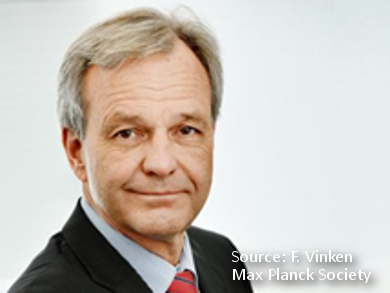Professor Karsten Danzmann, University of Hanover and Max Planck Institute for Gravitational Physics, Hanover, Germany, has been awarded the Otto Hahn Prize 2017 by the Gesellschaft Deutscher Chemiker (GDCh, German Chemical Society), the Deutsche Physikalische Gesellschaft (DPG, German Physics Society), and the city of Frankfurt am Main, Germany.
The award honors outstanding achievements in chemistry, physics, or engineering, and includes a prize money of 50,000 €. It was presented at a ceremony in the historic St. Paul’s Church in Frankfurt am Main on November 2, 2017.
Karsten Danzmann is honored for his work on gravitational waves. His research on laser interferometry has laid the groundwork for the detection of gravitational waves at the Laser Interferometer Gravitational-Wave Observatory (LIGO) on September 14, 2015.
Karsten Danzmann studied physics at the University of Hanover, where he received his Ph.D. in 1980. He was a Scientific Assistant at the University of Hanover from 1978 to 1982, Staff Scientist at the Physikalisch-Technische Bundesanstalt Berlin, Germany, from 1983 to 1986, and Acting Assistant Professor of Physics at Stanford University, CA, USA, from 1986 to 1989. Danzmann was Project Leader Gravitational Waves at the Max Planck Institute of Quantum Optics, Garching, Germany, from 1990 to 1993. He then returned to the University of Hanover as Professor and Director of the Institute for Atom- and Molecular Physics. Since 2002, he also is Director at the Max Planck Institute for Gravitational Physics.
Among other honors, Danzmann, together with the LIGO Discovery Team, has received the Gruber Prize from the Gruber Foundation in 2016, the Special Breakthrough Prize in Fundamental Physics in 2016, and the Group Achievement Award of the Royal Astronomical Society in 2017. He is a Fellow of the American Physical Society and a Member of the Academy of Sciences in Hamburg, Germany.
Selected Publications
- Observation of Gravitational Waves from a Binary Black Hole Merger,
K. Danzmann et al.,
Phys. Rev. Lett. 2016.
DOI: 10.1103/PhysRevLett.116.061102 - LIGO: the Laser Interferometer Gravitational-Wave Observatory,
K. Danzmann et al.,
Rep. Prog. Phys. 2009, 72, 076901.
DOI: 10.1088/0034-4885/72/7/076901 - Predictions for the rates of compact binary coalescences observable by ground-based gravitational-wave detectors,
K. Danzmann et al.,
Classical Quantum Gravity 2010, 27, 173001.
DOI: 10.1088/0264-9381/27/17/173001 - GW151226: Observation of Gravitational Waves from a 22-Solar-Mass Binary Black Hole Coalescence,
K. Danzmann et al.,
Phys. Rev. Lett. 2016.
DOI: 10.1103/PhysRevLett.116.241103 - A gravitational wave observatory operating beyond the quantum shot-noise limit,
K. Danzmann et al.,
Nat. Phys. 2011, 7, 962–965.
DOI: 10.1038/nphys2083 - Advanced LIGO,
K. Danzmann et al.,
Classical Quantum Gravity 2015, 32, 074001.
DOI: 10.1088/0264-9381/32/7/074001
Also of Interest
- Otto Hahn Prize 2015,
ChemViews Mag. 2015.
Physicochemist Professor Jürgen Troe honored for his work on reaction kinetics - Otto Hahn Prize 2013,
ChemViews Mag. 2013.
Ferenc Krausz, Germany, has been awarded the Otto Hahn Prize 2013 for his work on attosecond physics - M. Reetz Receives Otto Hahn Prize,
ChemViews Mag. 2011.
Manfred Reetz, Director of the Max-Planck-Institute for Coal Research, receives the Otto Hahn Prize from the GDCh




